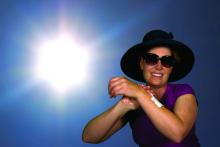In a global survey, 88% of respondents knew that unprotected sun exposure leads to skin cancer, but less than 60% “always” or “often” applied sunscreen to their faces, arms, and legs, researchers said.
Many respondents also reported ignoring whole categories of sun-protective behaviors – such as wearing long sleeves and seeking shade – and lacked knowledge about individual risk factors for skin cancer, such as skin type and size of moles, Sophie Seite, PhD, and her coauthors reported in the Journal of the European Academy of Dermatology and Venereology. These data suggest “that messaging needs to be specifically targeted for at-risk demographics (especially by age, gender, skin type, and country),” they added.
The study included 19,569 respondents aged 15-65 years from 23 countries who answered questions online, face to face, or by telephone. Globally, respondents most often reported wearing sunscreen and sunglasses for sun protection. Only 19% regularly wore sun-protective clothing, and only 38% regularly wore a hat or cap, the investigators said (J Eur Acad Dermatol Venereol. 2017 Jan 3. doi: 10.1111/jdv.14104).In the United States, 57% of respondents regularly used sunscreen on parts of the body exposed to the sun, 55% regularly applied sunscreen to the face, 64% wore sunglasses with UV filters, and 52% tried to stay in the shade when outdoors. But only 26% reported year-round sun protection, and 20% reported not using sun protection at all, according to the U.S. data provided by one of the authors. Moreover, 21% of respondents in the United States believed it was safe to go out in the sun without protection if one was already tanned; 54% had never had a mole checked by a dermatologist; and only 38% checked their own moles at least once a year.
“Young people, men, [and] individuals belonging to a lower socioeconomic class or having a lower education level were all least likely to know or follow primary and secondary preventive measures,” the researchers said. They recommended health education messages about the role of sunscreen as an adjunct to a primary preventive method, such as wearing sun-protective clothing.
La Roche-Posay Dermatological Laboratories funded the study. Dr. Seite and one coinvestigator reported being employees of the company.


